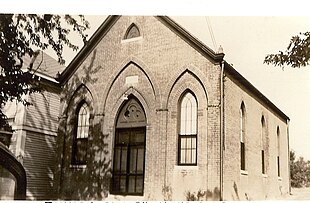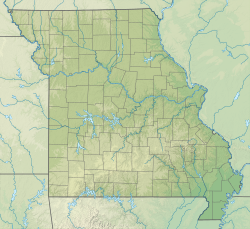
A synagogue, also called a shul or a temple, is a place of worship for Jews and Samaritans. It has a place for prayer where Jews attend religious services or special ceremonies such as weddings, bar and bat mitzvahs, choir performances, and children's plays. They also have rooms for study, social halls, administrative and charitable offices, classrooms for religious and Hebrew studies, and many places to sit and congregate. They often display commemorative, historic, or modern artwork alongside items of Jewish historical significance or history about the synagogue itself.

Temple Beth-El is a Reform Jewish congregation and synagogue, located at 800 North Palafox Street, in downtown Pensacola, Florida, in the United States. Founded in 1876, it is the oldest Jewish congregation in Florida.

Congregation Beth Israel is a Reform Jewish congregation and synagogue located at 701 Farmington Avenue, in West Hartford, Connecticut, in the United States.

Congregation Beth Elohim, also known as the Garfield Temple and the Eighth Avenue Temple, is a Reform Jewish congregation and historic synagogue located at 274 Garfield Place and Eighth Avenue, in the Park Slope neighborhood of Brooklyn in New York City, New York, United States.
Jewish Texans have been a part of the history of Texas since the first European explorers arrived in the region in the 16th century. In 1990, there were around 108,000 adherents to Judaism in Texas. More recent estimates place the number at around 120,000.

Temple Beth El is a Reform synagogue located at in Bloomfield Township, Oakland County, Michigan, in the United States. Beth El was founded in 1850 in the city of Detroit, and is the oldest Jewish congregation in Michigan. Temple Beth El was a founding member of the Union for Reform Judaism in 1873, and hosted the meeting in 1889 during which the Central Conference of American Rabbis was established.
Congregation Am Tikvah is a combined Conservative and Reform Jewish congregation and synagogue located at 625 Brotherhood Way in San Francisco, California, in the United States. The congregation was formed in 2021 as the result of the merger of the Conservative B'nai Emunah and the Reform Beth Israel Judea congregations, with the latter formed in 1969 through a merger of the Conservative Congregation Beth Israel and the Reform Temple Judea. The congregation is affiliated with both the Union for Reform Judaism and the United Synagogue of Conservative Judaism.

B'er Chayim Temple is a Reform Jewish congregation and synagogue, located in Cumberland, Maryland, in the United States. As of 2008, B'er Chayim counted approximately 50 families as members.
The history of the Jews in Vancouver in British Columbia, Canada has been noted since the mid-19th century.
The United Hebrew Congregation is a Reform Jewish synagogue located at 13788 Conway Road in Chesterfield, a western suburb of St. Louis, Missouri, in the United States. It was the first Jewish Congregation established west of the Mississippi River.

This article deals in more detail with some of the notable synagogues of Jerusalem that do not have their own page as yet.
Temple Israel is a Reform Jewish congregation and synagogue, located at 3100 East Broad Street, in Columbus, Ohio, in the United States. Founded as the Orthodox Bene Jeshurun congregation in 1846, the congregation is the oldest Jewish congregation in Columbus, and a founding member of the Union for Reform Judaism. Its first religious leader was Simon Lazarus, a clothing merchant who founded what would become Lazarus department stores.

Beit Shalom Jewish Community is a Reform Jewish shared synagogue located at 2215 East Kimberly Road, on the east side of Davenport, Iowa, in the United States. The shared community facility was established in 2019 and is home to two congregations, Temple Emanuel, established in 1861, and Congregation Beth Israel, established in 1936. Temple Emanuel is the oldest Jewish congregation in Iowa and both congregation are affiliated with the Union for Reform Judaism.

The Jewish community of Houston, Texas has grown and thrived since the 1800s. As of 2008, Jews lived in many Houston neighborhoods and Meyerland is the center of the Jewish community in the area.
The city of Cumberland, Maryland is home to a small and declining but historically significant Jewish community. The city is home to a single synagogue, B'er Chayim Temple, one of the oldest synagogues in the United States. Cumberland has had a Jewish presence since the early 1800s. The community was largest prior to the 1960s, but has declined in number over the decades. Historically, the Jewish community in Cumberland maintained several synagogues, a Jewish cemetery, and a Hebrew school. By 2019, Cumberland's Jewish community had its lowest population point since the early 1900s.












